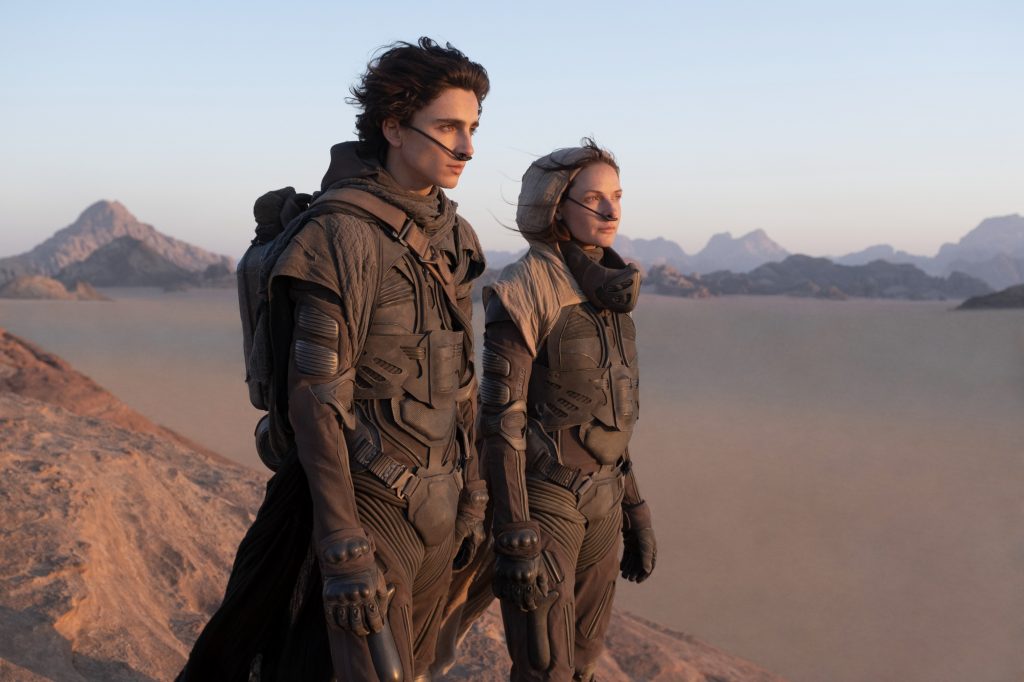The author of the 1965 science-fiction novel “Dune,” Frank Herbert, was not a great writer.
Still, I must confess enjoying the book as a young man so much that I quickly read the succeeding novels. The future universe he imagined in “Dune” still has its appeal to me, despite my disappointment in where those subsequent books took the story and its characters. The man had a great imagination.
So does the director of the film’s second film adaptation, which came out in theaters Oct. 22 and has received mostly positive reviews — and plenty of buzz in the cybersphere.
In fact, the gifted Denis Villenueve recently gave an interview that resonated with me. He recalled reading the lengthy novel at 14 and, even then, imagining making a film of it. Although he was warned that “Dune” fanatics would be hard to please, he said he made the movie with only one admirer of the book in his mind: himself.
He managed to please me, too — although it has yet to be seen if he can keep up the magic in the second half of the film adaptation (quite correctly, he realized the story would have to be split into two movies).
The film successfully immerses us in a futuristic constellation of worlds where, following an abolition of artificial intelligence won in a bloody war, a mysterious emperor rules, sharing power with several rival feudal dynasties. A powerful and secretive Space Guild controls interstellar trade and travel, while the mysterious magical sisterhood of Beni Gesserit wields unseen influence.
The world of “Dune” is a funhouse intergalactic mirror of medieval history, with all sorts of religious symbolism thrown in. There are especially quasi-Islamic notions of the Mahdi (chosen one) and of the jihad holy war. A race of Bedouin-like warriors inhabit the desert planet Arrakis, the only source of “spice,” which is the basic element of the future culture, being both a kind of drug and an essential fuel of civilization.
Herbert said that his novels were “philosophic” fiction and he managed to weave all sorts of allusions to modern problems and issues into his future civilization: ecology, the scarcity of natural resources, perpetual power conflicts and shaky political alliances, religious fanaticism and mysticism, human genetic manipulation, the dangers of technological advances, a mysterious feminism of occult powers, imperialism, and colonialism — it’s all there wrapped up into a space opera and the warriors still have capes and swords.
Paul, played with some intensity by up-and-coming heartthrob actor Timothee Chalamet, is the son of Duke Leto Atreides, whose family, descendants of the Greek Atreides clan of Agamemnon, are given feudal rights over the planet Arrakis and its spice trade. His mother, Jessica, is a Beni Gesseret sister, a concubine with witch-like supernatural powers, who was supposed to give birth to a baby girl who would marry the heir of the rival Harkonnen dynasty, uniting political power and eventually breeding a future prodigy.
The Lady Jessica disobeyed her order’s Reverend Mother and, skipping steps, anticipated the goal of the secret genetic program, the birth of the “Kwisatz Haderach,” a messiah figure who would be able to see beyond space and time and transform civilization.

The first part of “Dune” the novel and the present movie is about the discovery of Paul’s heroic destiny. Like the mythologist specialist Joseph Campbell’s “Hero with a Thousand Faces,” the young man has special powers and a salvific mission revealed to him only during a dangerous adventure.
He is to be the long-awaited “Mahdi” messiah for the people of Arrakis and lead their liberation from foreign powers. Herbert saw an Arthurian motif to his story. Instead of Excalibur, there is an encounter with the hallucinogenic spice and his transformation into a Fremen “Mahdi,” or chosen one.
The heroic cycle described by Campbell is still popular culture, echoed even in the essentially puerile Marvel movies of people who discover their supernatural attributes through enduring suffering and conflict with evil powers. It is a sort of basic salvation myth. Someone will come who will deliver us, and that special person will have unique powers.
However — and this is an interesting twist — Herbert did not believe in hero worship. He warned that no one should ever identify Paul with the Christ story, but he revealed in a 1980 Omni magazine essay that he had in mind leaders who had wrapped themselves “in the mythic fabric of the society. Hitler did it. Churchill did it. Franklin Roosevelt did it. Stalin did it. Mussolini did it. My favorite examples are John F. Kennedy and George Patton.”
Yes, all of them are together in Herbert’s conception of the dangers of hero worship.
“This, then,” Herbert wrote, “was one of my themes for ‘Dune’: Don’t give over all your critical faculties to people in power, no matter how admirable those people may appear to be. … Enormous problems arise when human mistakes are made on the grand scale available to a superhero. … Heroes are painful, superheroes are a catastrophe.”
If Villeneuve is aware of Herbert’s antipathy to his own superhero, there is not much of a hint in this first part of “Dune.” In the books that follow the original “Dune,” Paul the superhero transcends humanity in power and eventually becomes inhuman. He is not a hero but an antihero.
In other words, the evolution of Paul in the series of novels parallels the skeptical development of his creator’s thought. In very striking and spookily contemporary language, Herbert once declared, “I now believe that evolution, or deevolution [sic] never ends short of death, that no society has ever achieved an absolute pinnacle, that all humans are not created equal. In fact, I believe attempts to create some abstract equalization create a morass of injustices that rebound on the equalizers.”
Pretty heady stuff that, whatever the dramatic rhetoric means exactly. Both that quote and the further novels indicate that the foundational myth of the long-awaited messiah can contain complex contradictions, and Herbert didn’t trust leaders to save us.
You can, of course, just enjoy this first movie as a story of the battle of good and evil, in an exotic fictional universe with a fugue of modern themes that can make good conversation with fellow aficionados. I did.

